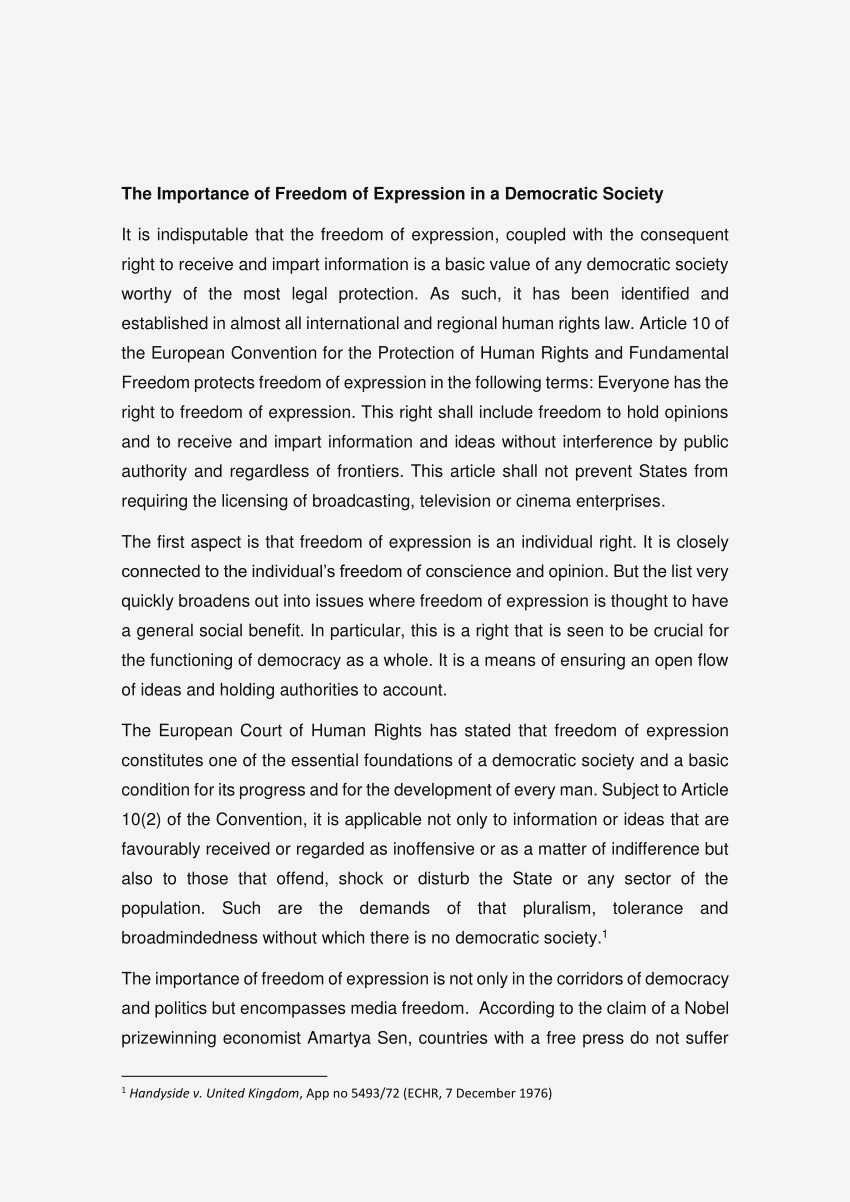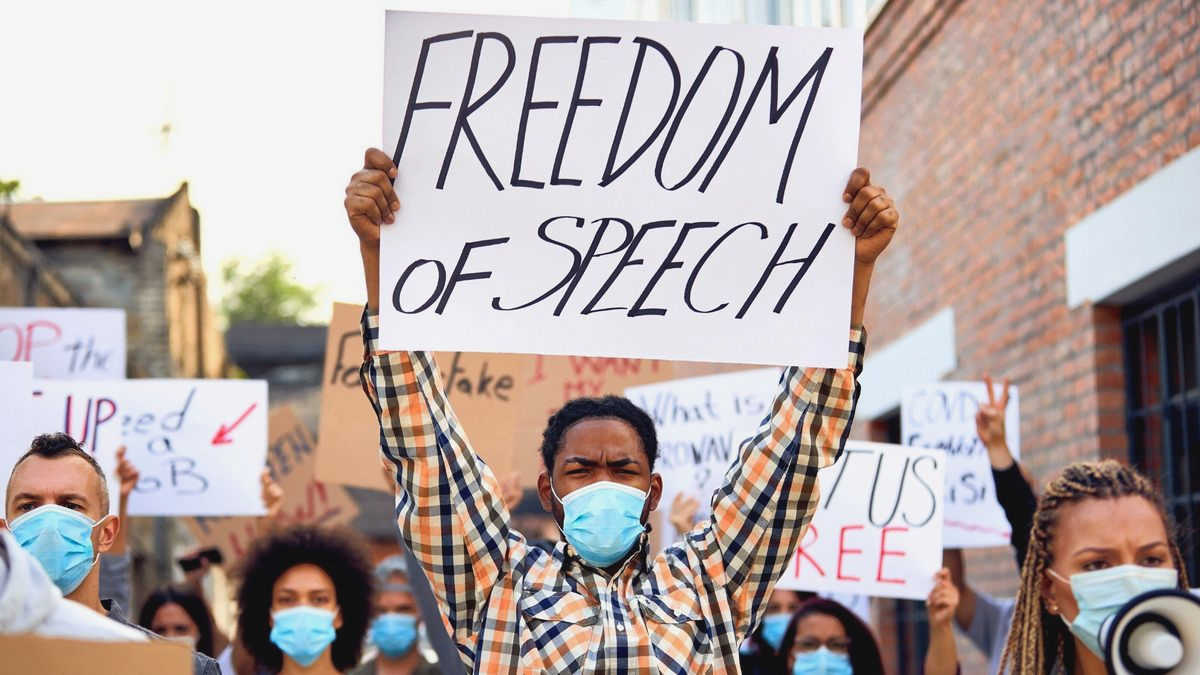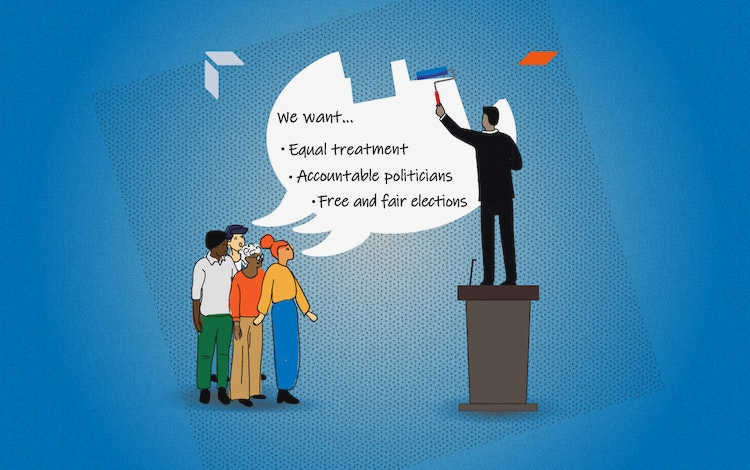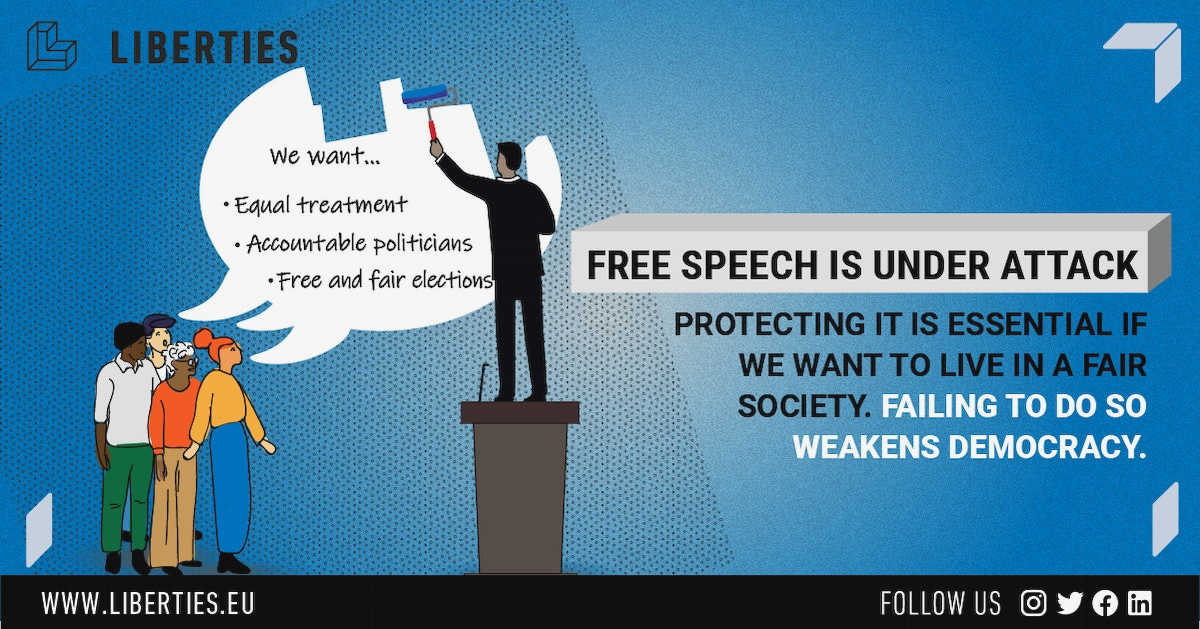The freedom of speech is one of the fundamental pillars of a civilized society. It allows individuals to express their thoughts, ideas, and opinions without fear of censorship or persecution. This freedom is not only vital for the functioning of a democratic society, but it is also essential for progress and development.
Freedom of speech gives individuals the power to challenge the status quo, question authority, and promote change. It allows them to voice their concerns and hold those in power accountable. Without the freedom to speak freely, societies can become stagnant, oppressive, and resistant to change.
Furthermore, the freedom of speech enables the exchange of ideas and fosters intellectual growth. When individuals are free to express their opinions, they can engage in meaningful discussions and debates. This exchange of ideas is essential for the advancement of knowledge, as it allows for the exploration of different perspectives and the development of new and innovative solutions to societal problems.
Moreover, freedom of speech is closely linked to other fundamental human rights, such as freedom of the press, freedom of assembly, and freedom of association. These rights work in tandem to create an environment where individuals can express themselves and participate in the democratic process. Without the freedom of speech, these rights are meaningless, as individuals are unable to voice their concerns, contribute to public discourse, and engage in peaceful assembly.
In conclusion, the importance of freedom of speech in civil society cannot be overstated. It is a fundamental right that enables individuals to express themselves, challenge the status quo, and promote change. It fosters intellectual growth and facilitates the exchange of ideas. Moreover, it is closely linked to other fundamental human rights, working together to create a democratic society that values and respects the voices of its citizens. Without freedom of speech, progress and development are hindered, and democratic values are compromised.
Why Freedom of Speech is Crucial for Civil Society
The freedom of speech is an essential pillar of civil society because it enables individuals to express their thoughts, ideas, and opinions without fear of censorship or retribution. This fundamental right allows for open, honest, and robust discussions, which are vital for the functioning of a democratic society.
Freedom of speech fosters the exchange of diverse viewpoints and perspectives, ensuring a vibrant marketplace of ideas. When people are free to express their opinions, new and innovative solutions to societal problems can emerge. It allows for constructive criticism and dialogue, leading to social progress and the development of more inclusive policies.
Moreover, freedom of speech plays a crucial role in holding those in power accountable. It allows for the exposure of corruption, abuse of authority, and other misconduct by public officials. Without this freedom, citizens would be unable to voice their concerns, leading to the erosion of transparency and accountability in governance.
Furthermore, freedom of speech promotes cultural diversity and understanding in civil society. It allows individuals from different backgrounds to share their unique experiences, fostering empathy and mutual respect. By embracing diverse voices, societies can challenge stereotypes, prejudices, and discrimination, leading to greater social cohesion and harmony.
In addition, freedom of speech is essential for the protection of other fundamental rights, such as freedom of assembly, religion, and the press. It serves as a safeguard against the infringement of these rights by governments or powerful entities. Without the ability to freely express oneself, individuals would be silenced and prevented from participating fully in democratic processes and decision-making.
In conclusion, the freedom of speech is crucial for civil society as it enables open, honest, and diverse discussions, holds those in power accountable, promotes cultural understanding, and protects other fundamental rights. It is a fundamental pillar of democracy, allowing for progress, inclusivity, and the fostering of informed and engaged citizens.
How Freedom of Speech Benefits Democratic Progress
Promotes open dialogue
Freedom of speech allows individuals to openly express their opinions, ideas, and concerns without fear of retribution or censorship. This promotes open dialogue and fosters a culture of critical thinking and intellectual exchange. In a democratic society, the free exchange of ideas is essential for informed decision-making and the development of well-rounded policies.
Ensures government transparency
Freedom of speech acts as a check on the power of the government, as it enables citizens to hold their leaders accountable. When individuals are free to express their opinions and voice their concerns, it helps uncover corruption, expose wrongdoing, and highlight issues that may otherwise go unnoticed. Through public accountability, a democratic society can ensure that its government operates in the best interest of its citizens.
Fosters social progress
Freedom of speech encourages discussions on complex and controversial issues, such as human rights, social justice, and equality. By allowing individuals to express their views openly, it creates opportunities for societal reflection and introspection. These discussions can lead to greater awareness, empathy, and ultimately, social progress. Through open dialogue, a democratic society can address the most pressing issues of its time and work towards a more equitable and inclusive future.
Protects minority rights
In a democratic society, minority groups often face discrimination and marginalization. Freedom of speech provides a platform for these voices to be heard and their concerns to be addressed. By protecting the right to express dissenting opinions, a democratic society can ensure the protection of minority rights and prevent the tyranny of the majority. This allows for a more inclusive and diverse society, where all individuals have equal opportunities and representation.
Encourages innovation and creativity
Freedom of speech is essential for fostering innovation and creativity. When individuals are free to express their ideas without fear of censorship or retaliation, it creates an environment that nurtures intellectual exploration and the exchange of knowledge. This enables the development of new technologies, breakthroughs in science, and advancements in the arts. By encouraging free expression, a democratic society can spur innovation and drive progress in various fields.
The Power of Expression in Civil Society
Freedom of speech is a fundamental pillar of civil society, providing individuals with the power to express their thoughts, opinions, and ideas. It enables citizens to participate in democratic processes and contribute to the progress of their society.
Expressing oneself freely allows for the exchange of diverse perspectives, fostering a culture of tolerance, understanding, and respect within a community. It encourages people to engage in open dialogue, challenging prevalent norms, and contributing to the development of new ideas.
The power of expression in civil society extends beyond the individual level. It allows organizations and institutions to advocate for change, raising awareness about critical issues and mobilizing support for various causes. Through public discourse and peaceful demonstrations, civil society can drive social, economic, and political transformation.
Furthermore, freedom of speech acts as a safeguard against the abuse of power and corruption. A society that values and protects this right encourages transparency, accountability, and good governance. It empowers individuals to hold those in positions of authority accountable and ensure the protection of human rights.
In addition to its role in fostering democratic progress, the power of expression also plays a vital role in shaping cultural identity and preserving heritage. Through artistic expression, storytelling, and cultural exchange, civil society can celebrate diversity, preserve local traditions, and generate a sense of belonging among its members.
In conclusion, the power of expression in civil society is crucial for democratic progress, societal development, and the preservation of cultural heritage. By protecting and promoting freedom of speech, communities can create an environment that values diversity, encourages open dialogue, and empowers individuals to contribute to the betterment of their society.
Promoting Diversity of Thought and Ideas
In a civil society, the promotion of diversity of thought and ideas is essential for the development and progress of democratic societies. Freedom of speech allows individuals to express their unique perspectives, beliefs, and ideas, fostering intellectual diversity and innovation.
Intellectual diversity is the foundation of a vibrant and dynamic society. It encourages individuals to think critically, challenge existing norms, and explore new possibilities. When people are free to express their thoughts and ideas without fear of censorship or persecution, they are more likely to engage in open and constructive dialogue, leading to the discovery of new solutions and the advancement of knowledge.
Freedom of speech also plays a crucial role in promoting social change and addressing systemic issues. It provides a platform for marginalized voices to be heard, amplifying their experiences and perspectives. By allowing individuals to express their concerns and grievances, freedom of speech helps to uncover societal injustices and facilitates the collective quest for equality and justice.
Diversity of thought fosters a fertile ground for innovation and progress. When people with different backgrounds, beliefs, and experiences come together, they bring unique perspectives and insights that can lead to groundbreaking discoveries and advancements in various fields. By embracing diverse ideas and perspectives, society can tap into a vast pool of knowledge, leading to the growth and development of individuals and communities.
It is important to recognize that promoting diversity of thought and ideas does not mean endorsing harmful or hateful speech. While freedom of speech should be protected, there should also be responsible limits in place to prevent the spread of hate speech or misinformation that can harm individuals or society as a whole. Striking the right balance between freedom of speech and responsible expression is crucial for maintaining a civil and inclusive society.
The Role of Freedom of Speech in Challenging Authority
Freedom of speech plays a crucial role in challenging authority and holding those in power accountable. It serves as a powerful tool for individuals and societies to question and critique the actions and decisions of those in positions of authority. Without the freedom to express their opinions and ideas, individuals would be silenced and unable to challenge the status quo.
By allowing individuals to voice their dissent and criticism, freedom of speech promotes transparency and reduces the risk of abuse of power. It enables citizens to bring attention to issues of concern and demand change from their leaders. Through open dialogue and public discourse, freedom of speech creates an environment where alternative viewpoints can be heard and considered, fostering a culture of participation and active citizenship.
Moreover, freedom of speech serves as a catalyst for social progress and innovation. It allows for the exchange of ideas and the exploration of new perspectives, leading to the development of new knowledge and solutions. It enables individuals to challenge outdated or oppressive practices and advocate for societal change.
However, it is important to note that freedom of speech does not guarantee immunity from consequences. While individuals have the right to express their opinions, they are still accountable for the impact of their words. Hate speech, incitement to violence, and defamation, for example, are not protected under the umbrella of freedom of speech.
In conclusion, freedom of speech has a vital role in challenging authority and promoting democratic progress. It empowers individuals to question and hold those in power accountable, fosters transparency and innovation, and contributes to the overall development of a civil society. It is an essential pillar of any democratic system and should be protected and upheld.
The Connection Between Freedom of Speech and Human Rights
Intersection of Freedom of Speech and Human Dignity
Freedom of speech is a fundamental human right that is closely intertwined with the concept of human dignity. Human dignity is the inherent worth and value of every individual, and the ability to freely express oneself is essential for the realization of this dignity. When individuals are allowed to freely express their thoughts, opinions, and ideas, it empowers them to participate fully in society, make informed choices, and contribute to the development of a just and inclusive society.
Freedom of Speech as a Pillar of Democracy
Freedom of speech is not only a fundamental human right, but it is also a cornerstone of democracy. In a democratic society, individuals have the right to express their views, criticize those in power, and engage in political discourse. This free exchange of ideas is vital for the functioning of a democratic system, as it allows for a diversity of perspectives and the airing of different opinions. Without freedom of speech, citizens would be unable to hold their government accountable, challenge social injustices, and advocate for change.
Freedom of Speech and the Protection of Minority Rights
Freedom of speech is instrumental in safeguarding the rights of minority groups within a society. By allowing individuals to express their opinions without fear of persecution, discrimination, or censorship, freedom of speech ensures that minority voices are not silenced. It provides a platform for marginalized communities to share their experiences, advocate for their rights, and challenge societal norms and prejudices. Furthermore, the ability to openly discuss controversial topics and engage in respectful dialogue promotes understanding, empathy, and the advancement of human rights for all.

Protecting Dissent and Facilitating Social Change
Freedom of Speech as a Catalyst for Social Change
Freedom of speech plays a crucial role in facilitating social progress and change within a civil society. It allows individuals to express their opinions, ideas, and concerns, which can lead to the identification of societal issues and the development of solutions. Through the open exchange of ideas, diverse perspectives can be heard, and this diversity is essential for fostering innovation, creativity, and critical thinking. By protecting dissent, societies can challenge the status quo, question injustices, and work towards a more equitable and inclusive future.
The Importance of Protecting Dissenting Voices
Protecting dissenting voices is vital for the health and vitality of a civil society. By allowing individuals to express their dissenting opinions, societies can foster a culture of open dialogue and debate. This, in turn, helps to challenge and refine existing ideas, policies, and systems. Without the protection of dissent, society may become stagnant, resistant to change, and vulnerable to corruption and abuse of power. The ability to openly express disagreement and critique is a key component of democracy and is necessary for maintaining a healthy and functioning society.
The Role of Freedom of Speech in Advancing Minority Rights
Freedom of speech not only protects individuals’ right to express dissent but is also crucial in advancing and protecting the rights of minority groups. By allowing marginalized communities to voice their concerns and experiences, society can become more aware of systemic inequalities and work towards rectifying them. Freedom of speech provides a platform for underrepresented voices to be heard, and their stories can create empathy, understanding, and ultimately, societal change. Through the protection of dissenting voices, civil society can strive towards a more just and equal society for all.
The Responsibility of Institutions in Protecting Dissent
Institutions within a civil society have a responsibility to protect and uphold freedom of speech. Governments, educational institutions, and media outlets should actively promote an environment where dissent can flourish. They should create policies that safeguard the right to express diverse opinions and protect individuals from censorship, harassment, or persecution. By fostering an atmosphere of inclusivity and respect for differing views, institutions can contribute to the progress and development of a civil society, where dissent is valued and social change is facilitated.
The Impact of Freedom of Speech on Political Participation
Freedom of speech plays a crucial role in shaping political participation within a civil society. When individuals are granted the freedom to express their thoughts, opinions, and ideas without fear of persecution or censorship, it encourages active engagement in political discussions and debates.

Firstly, freedom of speech fosters the exchange of diverse perspectives and encourages open dialogue. When individuals feel free to voice their opinions, it creates a platform for the sharing of ideas, leading to a more informed and nuanced understanding of political issues. This exchange of ideas is essential for the democratic process, as it allows citizens to critically assess different viewpoints and make informed decisions.
Furthermore, freedom of speech enables citizens to hold their government accountable for its actions. Through public criticism and the ability to voice grievances, individuals can bring attention to issues of concern and advocate for change. This active participation in the political sphere helps to ensure transparency, honesty, and ultimately, a more accountable government.
In addition, freedom of speech empowers marginalized and underrepresented groups within society. When these groups are granted the freedom to express their needs, concerns, and aspirations, it amplifies their voices and increases their visibility in the political landscape. This inclusivity and representation are vital for a democratic society, as it allows for a more diverse range of perspectives and experiences to be considered in decision-making processes.
Overall, freedom of speech has a significant impact on political participation within a civil society. It fosters open dialogue, holds governments accountable, and empowers marginalized groups. It is a fundamental pillar of democracy and plays a vital role in shaping the progress and development of a nation.
Building Trust and Transparency in Civil Society
In order for a civil society to thrive, it is essential to establish and maintain trust and transparency among its members. Trust is the foundation of any successful relationship, and without it, the functioning of a society becomes compromised. Transparency, on the other hand, ensures that information and decision-making processes are accessible to all, promoting accountability and preventing corruption.
Trust:
Trust is the glue that holds a civil society together. When individuals trust each other, they are more likely to collaborate, share information, and work towards common goals. Trust enables effective communication and cooperation, fostering an environment where ideas and opinions can be freely expressed and respected. In a society where trust prevails, citizens feel empowered to participate in public life, knowing that their contributions will be valued and taken seriously.
Transparency:
Transparency is a key principle that ensures accountability and fairness in a civil society. It involves making information and decision-making processes accessible to all members, promoting inclusivity and preventing the concentration of power. Transparent institutions and organizations allow citizens to understand how decisions are made and hold their leaders accountable for their actions. This creates a sense of fairness and reduces the likelihood of corruption and abuse of power. Transparency also helps to build trust among citizens, as they can see that their voices are being heard and that their concerns are being addressed.
Implementing measures to enhance trust and transparency in civil society requires the involvement of both individuals and institutions. Citizen participation, open dialogue, and collaboration are crucial in fostering trust among members. Institutions should adopt practices that promote transparency, such as publishing reports and financial statements, conducting public consultations, and ensuring equal access to information. By prioritizing trust and transparency, civil society can create a strong foundation for democratic progress and promote the values of accountability, fairness, and inclusivity.
Defending Freedom of Speech in the Digital Age
Challenges in the Digital Era
With the rapid advancement of technology and the widespread use of the internet, the concept of freedom of speech has become more relevant than ever before. While the digital age has provided countless opportunities for individuals to express their opinions and share information, it has also given rise to new challenges.
One of the main challenges is the proliferation of online hate speech and fake news. The anonymity and reach provided by the internet have allowed individuals and groups to spread harmful and misleading information, leading to the erosion of trust in the media and public discourse.
The Role of Social Media Platforms
Social media platforms play a significant role in the defense of freedom of speech in the digital age. As the primary medium for communication and information sharing, these platforms have a responsibility to promote free expression while also combating harmful content.
Many social media platforms have implemented community guidelines and content moderation policies to address this issue. These policies are designed to strike a balance between allowing for diverse opinions and preventing the spread of hate speech, harassment, and misinformation.
Protecting Anonymity and Privacy
In the digital age, protecting anonymity and privacy is crucial in the defense of freedom of speech. The ability to speak freely without fear of retribution is a fundamental aspect of democratic societies.
However, it is essential to find a balance between ensuring privacy and preventing the misuse of anonymity. This requires the development of robust encryption technologies and the implementation of clear legal frameworks that address both individual privacy rights and the need to combat online criminal activities.
Education and Media Literacy
Another key aspect of defending freedom of speech in the digital age is promoting education and media literacy. Individuals need to be equipped with the skills to critically evaluate information, identify bias, and differentiate between reliable and unreliable sources.
By fostering media literacy, societies can empower individuals to engage in meaningful and constructive discussions, challenge misinformation, and make informed decisions. This, in turn, strengthens the role of freedom of speech as a vital tool for democratic progress in the digital era.
The Global Perspective: Freedom of Speech as a Universal Value
Freedom of Speech in International Human Rights
Freedom of speech is recognized as a universal value in international human rights declarations and agreements. The Universal Declaration of Human Rights, adopted by the United Nations General Assembly in 1948, explicitly states that "Everyone has the right to freedom of thought, conscience and expression." This recognition highlights the importance of freedom of speech as a fundamental right that should be protected and upheld by all nations.
Furthermore, the International Covenant on Civil and Political Rights, a legally binding treaty, also guarantees the right to freedom of speech. This demonstrates the global consensus on the significance of this freedom in ensuring the development and progress of societies.
Promoting Democracy and Accountability
Freedom of speech plays a crucial role in promoting democracy and holding governments accountable for their actions. In democratic societies, the ability to freely express ideas, opinions, and criticisms allows for public participation in decision-making processes. It enables citizens to voice their concerns, engage in political discussions, and contribute to the development of policies that reflect the needs and aspirations of the people.
Moreover, freedom of speech serves as a check on power. It allows individuals to expose corruption, abuse of authority, and violation of human rights. Journalists, activists, and whistleblowers depend on this freedom to uncover and report on matters of public interest, ensuring transparency and accountability in government.

Fostering Social Progress and Innovation
By protecting freedom of speech, societies foster an environment conducive to social progress and innovation. The free exchange of ideas and opinions encourages diversity of thought, leading to the generation of new perspectives and solutions to societal challenges. It enables individuals to challenge orthodoxies, question established norms, and push the boundaries of knowledge and understanding.
Furthermore, freedom of speech allows for open and honest discussions on sensitive and controversial issues. These debates contribute to social awareness and collective learning, facilitating the development and evolution of societal values and norms.

Conclusion
Freedom of speech is an essential universal value that underpins democratic progress, promotes accountability, and fosters social progress and innovation. It is an indispensable component of civil society, enabling citizens to freely express their ideas, participate in decision-making processes, and contribute to the betterment of society. Upholding and protecting this right is imperative for the advancement of democratic principles and human rights worldwide.





